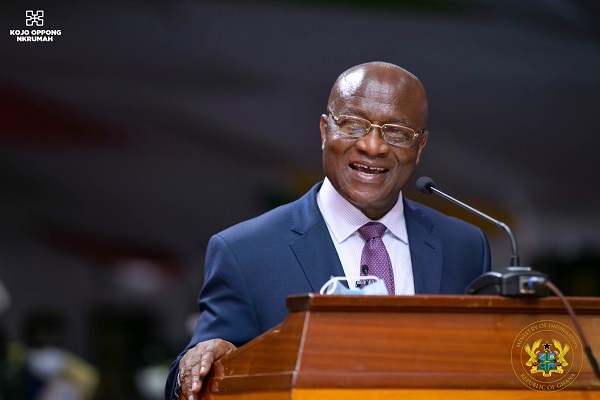Review asset declarations laws – Kyei Mensah Bonsu
The Minority Leader, Mr Haruna Iddrisu, advised the Special Prosecutor to also focus on the prosecution of corrupt heads of public institutions.

The Majority Leader in Parliament, Mr Osei Kyei-Mensah-Bonsu, has called for urgent reconsideration of the constitutional provisions on asset declarations made by public office holders to the Auditor-General (A-G) to make the fight against corruption meaningful.
He said an amendment of Article 286 of the Constitution would allow the A-G to thoroughly peruse the written declarations on assets, property, gifts, among others, which public office holders submitted to him for safe keeping under lock.
Such perusal, he said, would help to expose those who failed to declare or knowingly make false declarations as well as expose those who engaged in money laundering and improperly acquire assets over a period of time.
“The A-G perusing these documents, which are submitted to be kept under lock, will help in determining if there are any contradictions, suspicions or improprieties that are established by the A-G and they could be ferried to the Special Prosecutor for further investigations and prosecution,” he said.
Prosecutors must bite
Contributing to a debate ahead of the approval of Mr Kissi Agyebeng as the Special Prosecutor in Parliament last Friday, Mr Kyei-Mensah-Bonsu said “I believe that time has come for us to take a second look at Article 286 to expand the frontiers for investigations and pursuing criminals other than that we will make people, who are charged with the responsibility, to be reduced to toothless bulldogs who can only bark but will not be able to bite.”
The approval of Mr Agyebeng came after the Appointments Committee submitted its ninth report on the President’s nomination of Mr Agyebeng for appointment as SP.
The Majority Chief Whip, Mr Frank Annoh-Dompreh, presented the committee’s report on behalf of the chairman of the committee and moved a motion for the approval of the nominee.
Asset declarations
The Majority Leader said the SP was supposed to work in close collaboration with the Auditor-General in pursuing criminals, especially those who engaged in money laundering, corruption and invested in assets.
He quoted Article 286 (2), which provides that: “A person who holds a public office shall submit to the Auditor-General a written declaration of all property or assets owned by him whether directly or indirectly. Failure to declare or knowingly making false declaration shall be a contravention of this Constitution and shall be dealt with in accordance with Article 287 of this Constitution.”
He said if such declarations were made, the A-G should not place those written declarations in a safe under lock without authenticating such contents.
“Mr Speaker, how is anybody to know that a person has failed to declare or knowingly made false declarations in respect of his asset, if the AG is not allowed to look at his declarations?” he asked.
Best practice
He pointed out that the Attorney-Generals in most parts of the world were able to authenticate and investigate asset declarations by public officers.
“If you say you have acquired, maybe within a space of four years as a public officer 10 houses, they will look at your income. How did you get to possess or own 10 houses in four years and they will match it against your income?
“And then they will be able to establish whether you acquired those assets properly or improperly. But our case is different, so Mr Speaker, we have to look at this,” he said.
Public servants too
The Minority Leader, Mr Haruna Iddrisu, advised the Special Prosecutor to also focus on the prosecution of corrupt heads of public institutions.
He said the fight against corruption had often focused mostly on politically-exposed persons overlooking the fact that some top public servants also engaged in corrupt acts.
“Chief directors and chief executives are left as if they do not engage in corruption. Some of them do, and there is evidence,” he said.


